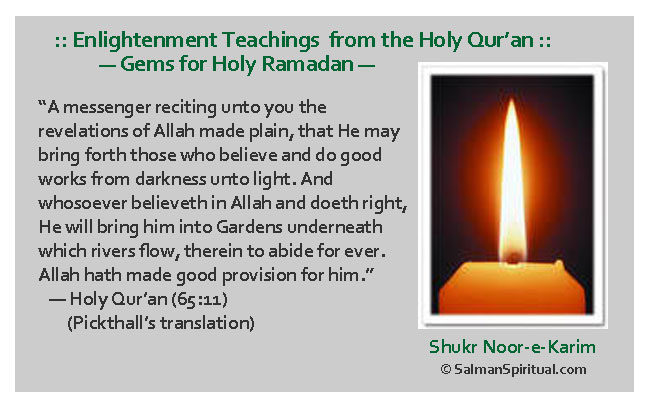

"Blessed be He Who hath placed in the heaven mansions of the stars, and hath placed therein a great lamp and a moon giving light!" — Holy Qur'an 25:61
:: Trait No. 24: A Dā'ī Should Be Forgiving and Merciful to Believers ::
Wednesday,
Jul. 31, 2024
Bismillahir Rahmanir Rahim
In the name of Allah, the Most Beneficent, the Most Merciful.
Ya Ali Madad and Ramadan Mubarak. This post consists of five parts
Part 1: Enlightenment Teachings from the Holy Qu'ran

Part 2: An excerpt from 'A Code of Conduct—A Treatise of the Etiquette of the Fatimid Ismaili Mission'
In 'al-Risāla al-mūjaza al-kāfiya fī of Ahmad b.Ibrāhīm al-Naysbūrī has written the following gem:
"[§50] A dâ'î should be forgiving and merciful to the believers, not malicious, not overly preoccupied with retribution, aggravations, disputes and contention. Novice believers will always be lacking in knowledge and subject to mistakes and erroneous intentions, which they then regret; but if they are not treated kindly and forgiven for it, they will despair of religion. God has said: 'O My servants who have transgressed against their own souls, do not despair of the mercy of God for He forgives all sins';66 and He said to Muhammad His Prophet: 'Accept forgiveness; command the right; but turn away from those who are ignorant';67 and He said also: 'Lower your wing to those of the believers who follow you.'68"
(Source: Klemm, V. and Walker, P. E., A Code of Conduct—A Treatise of the Etiquette of the Fatimid Ismaili Mission, pp.53-54)
Footnotes
66. Qur'an, 39:53.
67. Qur'an, 7:199.
68. Qur'an, 26:215.
Part 3: Dhikr Tasbi
Let us recite a luminous dhikr titled 'Rabbi zidni ilmaa' (Lord, increase me in knowledge) in our spiritual hearts and create an aspiration to actualize the Light of the Holy Ahlul-Bait and Noor Mowlana Hazar Imam. May our spiritual hearts get filled with this NOOR and nothing else. Ameen.
Bismillahir Rahmanir Rahim
In the name of Allah, the Most Beneficent, the Most Merciful
Rabbi zidni ilmaa
My Lord, increase me in knowledge!
Al-hamdu lillahi rabbil 'alamin.
Praise be to Allah, the Lord of the worlds!
Part 4: Angelic Salwat
Let us now start presenting a nazrana of angelic salwats to our beloved NOOR Mowlana Shah Karim Al-Hussaini Hazar Imam for blessings, guidance and empowerment for the fulfillment of our noble wishes. May our beloved Noor Mowlana Hazar Imam continually keep us on the Right Path. Ameen.
Bismillahir Rahmanir Rahim
In the name of Allah, the Most Beneficent, the Most Merciful
Allâhumâ salli alâ Muhammadin wa âle Muhammad:
O Allah! Bestow Peace on and through Muhammad and his Descendants
or
Al-hamdu lillahi rabbil 'alamin.
Praise be to Allah, the Lord of the worlds!
Part 5: Global Prayers and Three Grand Aspirations
Through the barakat of recitation of Holy Ginans, gratitude tasbi and angelic salwat by many individuals of the global Jamat,
O Noor Mowlana Hazar Imam, bless the global Jamat with:
Haizinda — Qayampaya
(Our Present Imam is Living and His NOOR is Eternal)
Traits of an Ismaili Dai